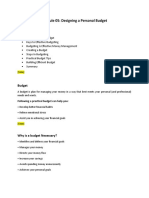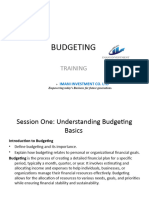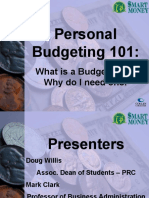0% found this document useful (0 votes)
8 views2 pagesClass Notes Introduction To Personal Budgeting
This document provides an introduction to personal budgeting, emphasizing its importance in managing income, expenses, and savings. It outlines key terms, steps to create a budget, tools for budgeting, and common mistakes to avoid. The overall message is that budgeting enables informed financial choices and requires regular review and discipline for success.
Uploaded by
tesla4275Copyright
© © All Rights Reserved
We take content rights seriously. If you suspect this is your content, claim it here.
Available Formats
Download as PDF, TXT or read online on Scribd
0% found this document useful (0 votes)
8 views2 pagesClass Notes Introduction To Personal Budgeting
This document provides an introduction to personal budgeting, emphasizing its importance in managing income, expenses, and savings. It outlines key terms, steps to create a budget, tools for budgeting, and common mistakes to avoid. The overall message is that budgeting enables informed financial choices and requires regular review and discipline for success.
Uploaded by
tesla4275Copyright
© © All Rights Reserved
We take content rights seriously. If you suspect this is your content, claim it here.
Available Formats
Download as PDF, TXT or read online on Scribd
/ 2

























































